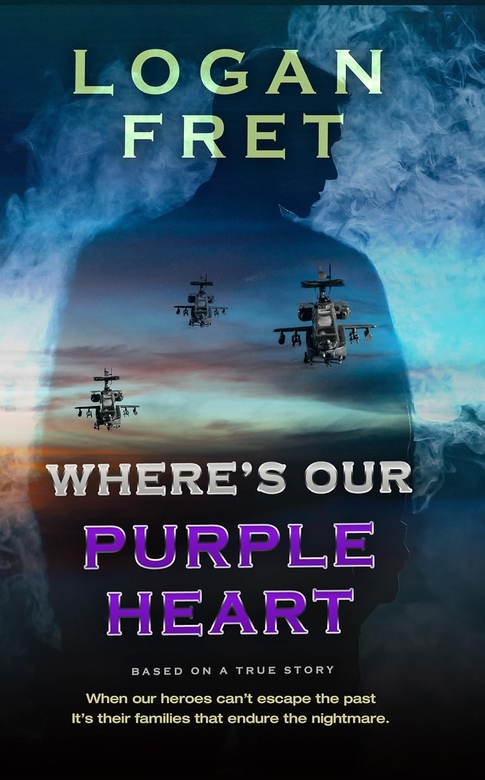
Peeling back the complex layers of grief, family, trauma, and secrets, Where’s Our Purple Heart by Logan Fret is a raw examination of the feelings we fear and the memories we bury.
After his gun-loving, hard-drinking, war hero father dies unexpectedly, Todd must navigate a surge of emotions, especially the feelings of relief and a distinct lack of sadness. He struggles to mourn an abusive father who had leveled a murderous threat against him, which forced Todd to hide his queer identity for years and prevented any resolution or authenticity in their relationship. Now, with the main obstacle to his freedom gone, Todd is faced with the people-pleasing task of comforting other family members and friends who had never experienced his father’s bigotry and drunken rages.
Torn between living openly without the shadow of his homophobic father and sincerely processing the loss with those who care about him, this jilted son is awash in a sea of memory, second-guessing, and regret over things left unsaid. Peppered with visceral memory sequences that immerse readers in the horrors of war, childhood trauma, repression, fear, and abuse, this novel is far from an easy read, but it addresses realities that deserve attention and space within today’s culture. Avoiding hard truths is no way to move past them, as Todd learns in various ways throughout the novel, making this an impactful and timely read for a broad audience.
The author discusses difficult subjects and truths about Todd’s life with tenderness and compassion, reflecting on the choices he had to make, even those that felt self-destructive or inauthentic to the lifestyle he wanted to embrace. The thematic explorations of bisexuality, masking, closeted behavior, and fear of judgment or persecution are incredibly relevant for contemporary LGBT readers and anyone else who wants to move through the modern world with more grace and understanding.
There are some contradictory elements of the story, such as Todd and Aaron’s treatment and perspective on their sister’s struggles with addiction – a common symptom for those with a traumatic upbringing. This condescension or dismissal of “drug addicts” feels jarring, given the nuance with which other personal challenges are handled in the prose. The narration is also declarative throughout much of the book, telling readers what characters are feeling or saying, rather than sharing that through dialogue or organic scene development. While Todd’s reflections and experiences are painful, and may be compartmentalized away as cold hard facts, the style of writing occasionally keeps readers at arms’ length, particularly in the first half of the book.
That said, there are many beautiful exchanges between certain characters, especially Todd’s moments with Courtney and his gramma, and the prose does improve as the narrative moves forward, so while some small editorial tweaks could elevate this book even further, it already stands as a testament to self-preservation, pride, and the burdens we silently bear. Illustrating the catharsis and challenge of opening up to people, Where’s Our Purple Heart is a poignant examination of the imperfections of family and how no single person is necessarily to blame, resulting in a relatable and emotionally rich work of contemporary fiction.
Book Links
STAR RATING
Design
Content
Editing
Get an Editorial Review | Get Amazon Sales & Reviews | Get Edited | Get Beta Readers | Enter the SPR Book Awards | Other Marketing Services























Leave A Comment